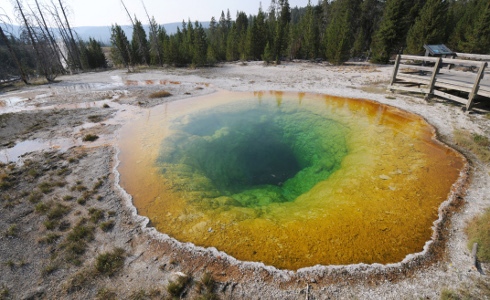So Many People Threw Pennies Into This Yellowstone Hot Spring That It Changed Colors
It's the slowest Mood Ring of all time.

Image credit: Joseph Shaw, Montana State University, August 2012
To be fair, perhaps we as a nation karmically brought this upon ourselves by naming the place “Yellowstone.”
Once upon a time, the Morning Glory hot spring was deep blue in color, much like the flower it was originally named after. Over the decades, however, tourists visiting the natural attraction have changed its hue by tossing in coins, charms, rocks, and other foreign objects, which have partially blocked Morning Glory’s underground heat source and created an opportunity for new photosynthetic microorganisms that wouldn’t have been able to withstand the temperature before to now inhabit its waters.
Photo Credit: William S. Keller, 1966
Thanks to these pigmented “microbial mats,” Morning Glory is now a vibrant blend of greens and yellows, depending on how the heat is displaced throughout the spring—the orange outer rim, for example, is where the water is at its lowest temperature.
It would be really easy to walk with the assumption that this foreign interference into nature is fundamentally a bad thing. However, scientists at Montana State University were inspired by the spring’s new hue to create a mathematical model which predicts the way the color gradient is influenced by both microbes and the light hitting the water. They believe this model might even have far reaching effects for the future of microbiology. From Science Friday:
Using this initial model as a starting point, the authors hope to pursue collaborations with biologists to develop tools which incorporate chemical and optical data to monitor the microbial composition of pools like Morning Glory from afar, thus eliminating the need for costly on-site sampling. Indeed, for years, biologists from around the world have flocked to Yellowstone, where a new discovery could reveal a bacterium with pharmaceutical applications, an enzyme for renewable energy, or even shed light on the origins of life on our planet.
What do you know? That penny you threw on a summer vacation one time might have inadvertently revealed the origin of life.
(via BoingBoing)
Are you following The Mary Sue on Twitter, Facebook, Tumblr, Pinterest, & Google +?
Have a tip we should know? tips@themarysue.com